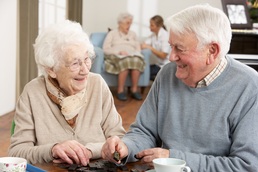A quarter of over 65s find being called 'old' and 'elderly' offensive

Over 65s have revealed that they think ageism in society is holding them back and not truthfully reflecting the feeling of their generation.
A survey showed that people aged over 65 feel that the terms ‘old’ and ‘elderly’ have become both negative and offencive and believe that their generation is sometimes ignored or treated disrespectfully because of their age. However 65 per cent of older people interviewed in a recent survey also admitted that they have not seriously thought about the type of care they might need as they get older, and worry about becoming a burden to friends and family members in the future.
Wendy Darling, managing director at Invicta Telecare, who commissioned the research, said: “With the number of us aged 65 and over set to increase rapidly, it’s important to tackle the old fashioned taboos that many are coming up against. We all need to be prepared to discuss this subject more openly within our families and make sure people get access to the right information and help for them.”
“It’s clear many worry they will lose their identity and be seen as a problem as they grow older so it’s important not to underestimate the support out there which will give full control of your freedom and independence. Something as simple as a personal alarm or wireless sensor, which only helps you when you really need it, will still make sure you live your life to the full.”
Only six per cent of the 2,000 people aged between 65 and 93 asked said they thought of themselves as ‘old’, with 80 per cent believing that their age group can still make a huge difference to the country.
Many of the over 65s surveyed felt happier now than at any other point in their life, and the majority refused to define themselves as old claiming it is just a mind-set.
It is expected that the number of over-65s will double within the next 40 years and the age group will make up 25 per cent of the population.
Latest News
 29-Jul-24
Dementia Bus gives carehome.co.uk staff insight into life with dementia
29-Jul-24
Dementia Bus gives carehome.co.uk staff insight into life with dementia
 01-Mar-24
Find out the top care homes in 2024
01-Mar-24
Find out the top care homes in 2024
 21-Mar-23
UK's top care homes in 2023 revealed
21-Mar-23
UK's top care homes in 2023 revealed
 03-Jan-23
carehome.co.uk launches free care helpline
03-Jan-23
carehome.co.uk launches free care helpline
 13-Dec-22
5 mins with Emily Whitehurst, chief operating officer for Constantia Healthcare
13-Dec-22
5 mins with Emily Whitehurst, chief operating officer for Constantia Healthcare